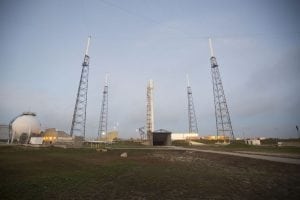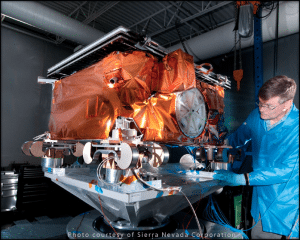Latest News
[Via Satellite 06-18-2014] Marc Eisenberg, CEO of Orbcomm, confirmed that the recent delays of the company’s next launch have not caused tension with its relationship with SpaceX. After setbacks caused by a helium leak on the Falcon 9, followed by additional time on Orbcomm’s behalf to recheck its satellites, the launch was reset for Friday June 20, 2014, with Saturday as a back-up date. Eisenberg told Via Satellite that claims about these delays causing angst between the two companies are misguided.
“We were delayed a month. Do you know what it means? Nothing! A failed launch, that means something, but a delayed launch? It’s not like I don’t have a constellation that’s being fielded,” said Eisenberg.
The relationship between SpaceX and Orbcomm stretches back to the days of the Falcon 1, when SpaceX had yet to conduct its first successful launch. Orbcomm needed to decide on a rocket around the same time it signed with Sierra Nevada Corporation to build the Orbcomm Second Generation (OG2) satellites.
“In the United States there are a couple of options you look at,” Eisenberg explained. “There are large rockets like Deltas and Atlas, but for small spacecraft these massive rockets didn’t make a lot of financial sense. Our satellites had grown too big for Pegasus, which flew our original constellation. It’s not so easy to source rockets here in the U.S.; you have access to Russia and the [European Union] (EU) but because of all the [International Traffic in Arms Regulations] (ITAR) restrictions, India and China are off the table even though they are well suited for our type of mission.”
Eisenberg said the Soyuz rocket was too large and expensive, and Russia was out of Rockot inventory at the time. SpaceX was attempting to launch the Falcon 1 following three failed attempts. Orbcomm, weighing its options, selected the Falcon 1 in spite of the risk.
“As with most startups, there were a couple of missions that didn’t go as planned and as they were struggling, we signed with SpaceX to be our launch provider for our whole constellation on the night before their first successful mission,” he said.
Orbcomm was the first commercial customer of SpaceX, making the contract a valuable backing for the Falcon rocket class. The original plan was to fit four OG2 satellites on a Falcon 1, necessitating five launches to place all 18 spacecraft in orbit. But as SpaceX progressed with NASA, its focus shifted more heavily to the Falcon 9. Out of respect for the initial contract, SpaceX offered to launch the OG2 satellites using the Falcon 9 for the same price as the Falcon 1 — an opportunity Orbcomm jumped at immediately.
“They were going to have several Falcon 1 missions, and those have been combined into two Falcon nine missions,” Elon Musk, CEO and chief designer of SpaceX, told Via Satellite. “They are certainly getting a discount because we are trying to honor the original agreement that we had.”
“The Falcon 1 contract is disclosed. It’s just under $50 million for those five smaller rockets for the whole constellation,” added Eisenberg. This agreement effectively cemented the relationship between the two companies, which remains unshaken by launch delays. “Space X has always been near and dear to our hearts and we hope they feel the same as we grow our businesses in parallel,” he said.
Even after the loss of a prototype satellite in 2012, Orbcomm continually states that the situation would be different had its satellite been the primary payload. Eisenberg said the constant testing of new rocket features does not worry him either.
“People ask me about the fact that they are putting grasshopper legs on the rocket and [saying] ‘what impact does that have on us?’ My answer is: none. If they want to test it, it’s after my launch and my satellites are up in the sky. As long as everything is safe, we are thrilled that [SpaceX] is able to advance the space industry,” he said.
The first batch of six OG2 satellites is set to fill a hole in Orbcomm’s original constellation. Some of the earlier spacecraft are drifting and are not in their proper phase. Orbcomm needs a minimum of five OG2 satellites to patch the opening that occurred. The new satellites carry much more propellant than their predecessors to avoid repeating this situation. Orbcomm’s second Falcon 9 launch, according to SpaceX’s manifest, is scheduled for later this year.
Stay connected and get ahead with the leading source of industry intel!
Subscribe Now
